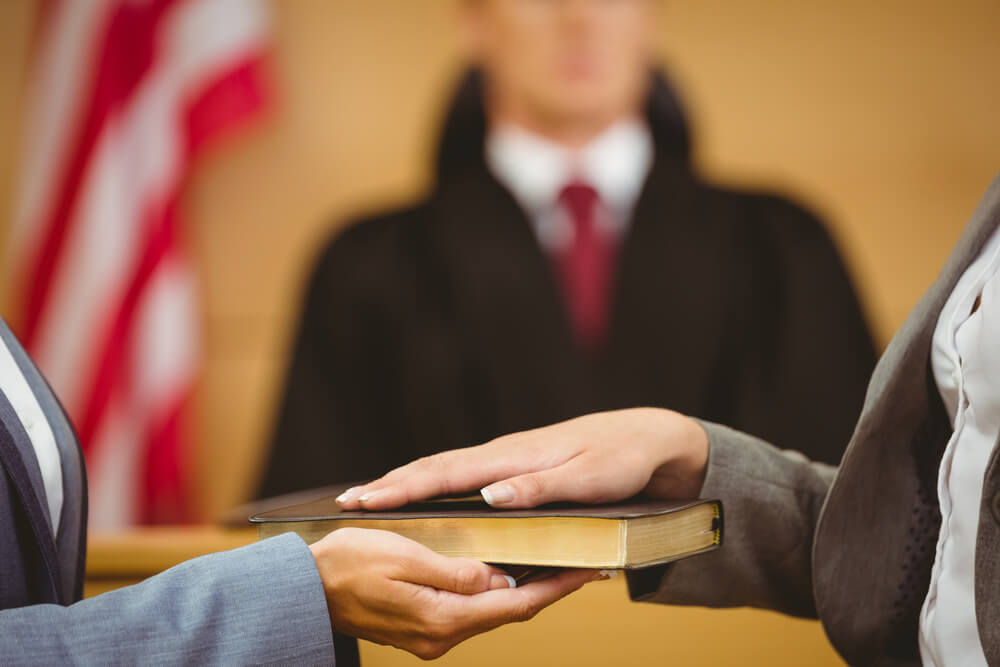Office Location
608 West 12th Street, Suite B Austin, TX 78701
legalassistant@wm-attorneys.com
A witness is someone who has the authority to testify in a criminal case – and in particular, at a criminal trial. The state prosecutor may call a witness, such as a police officer or an eyewitness, in order to satisfy their legal burden of proof in the case. Similarly, a defense attorney may call one or more witnesses at trial in support of a legal defense. But, Can a Witness be Charged with a Crime?
Tampering with a witness is a very serious criminal charge in Texas. If the accused individual commits this offense, they may face heavy penalties upon conviction, including jail time. However, a witness who knowingly testifies falsely or unlawfully in order to obtain a financial benefit could also be subject to a criminal conviction and penalties. Witnesses could also be subject to perjury charges if they knowingly make a false statement while testifying under oath.
In addition, witnesses have certain legal rights while they are on the stand, including a Fifth Amendment constitutional right against self-incrimination.
If you recently received a subpoena requiring you to testify as a trial witness, it is important that you speak with experienced legal counsel right away. At the Law Office of David D. White, PLLC, we can work to protect your rights and ensure that they remain protected throughout the criminal proceedings.
Tampering with a witness is a serious criminal charge in Texas. A witness at a Texas criminal proceeding may be guilty of this offense if they intentionally and knowingly accept, agree to accept, or solicit a benefit by doing any of the following:
If a prosecutor determines that a witness is guilty of any of the above, a sentencing judge will have the task of imposing the necessary criminal penalties. Those penalties may include a maximum monetary fine of $10,000, a maximum of 10 years in jail, or both.
Testifying as a witness during a Texas criminal case often comes with several additional consequences. Those potential consequences may include:
During criminal trials and other legal proceedings, witnesses in a case have several legal rights. First, they have a legal right against self-incrimination. Therefore, if a prosecutor calls them to the witness stand to testify in a case, they could “take the Fifth” in response to a particular question. When a witness makes this statement, they are effectively refusing to answer the question on the grounds that their response might tend to incriminate them. However, just because a witness provides this response does not necessarily mean that they may completely decline or refuse to provide a statement.
In addition, criminal court witnesses have a right not to be subject to harassment by others in the legal system. Therefore, if a witness is subject to cross-examination while on the witness stand, a prosecutor cannot threaten or belittle them – or ask them the same questions repeatedly.
Witnesses do not have the same rights as criminal defendants to refuse to testify in a case. In fact, if a witness refuses to testify, a judge could hold them in contempt of court. Consulting with an experienced attorney before your court proceeding is a good idea – especially if you think that testifying in court may subject you to an accusation of criminal activity.
At the Law Office of David D. White, PLLC, we could answer all of your questions about testifying at a criminal court proceeding. For a free case evaluation and legal consultation with an experienced Texas criminal defense lawyer, please call us at 512-369-3737 or contact us online today.
While other states list manslaughter in various forms, the Texas Penal Code (Section 19.04) defines manslaughter in simpler terms. Involuntary or accidental manslaughter means causing another person’s death as t...
A minor who buys, attempts to purchase, or drinks alcohol may face some large fines and possibly jail time for a third offense. Anyone facing these allegations needs help from an Austin criminal defense attorney r...
The State of Texas divides criminal offenses into felonies and misdemeanors, with felonies being the more serious charges. Although Class C misdemeanors are less-serious criminal offenses, they can still garner pe...
608 West 12th Street, Suite B Austin, TX 78701
legalassistant@wm-attorneys.com